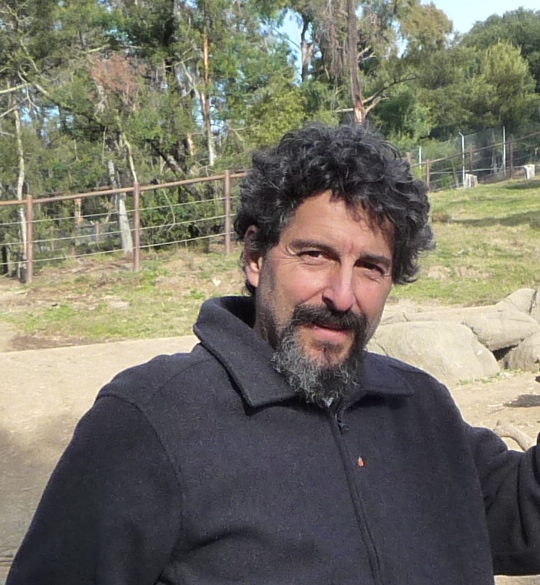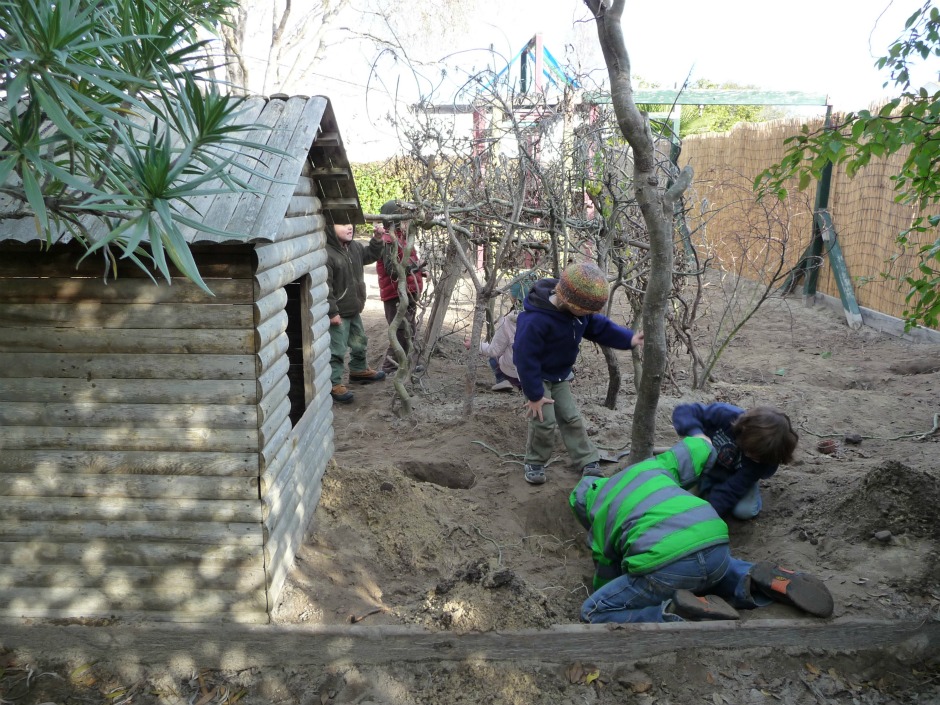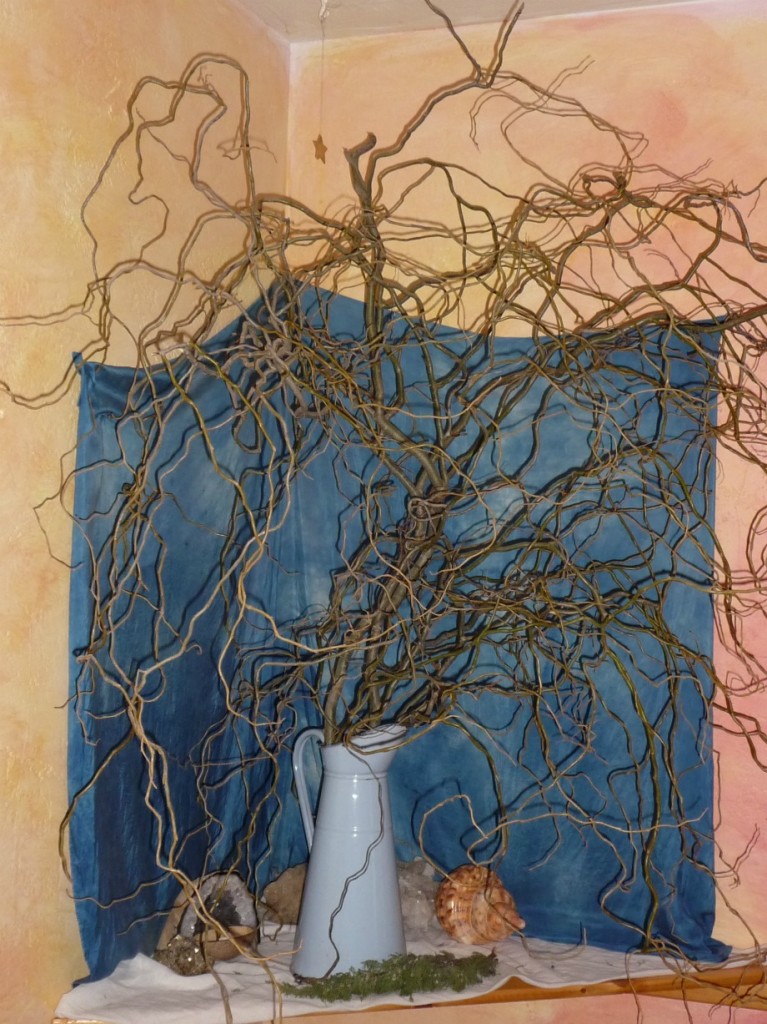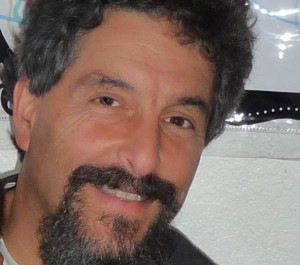Spotlight on Early Childhood :: Stephen Spitalny
I am delighted to bring you a picture of Stephen Spitalny’s Kindergarten. Stephen Spitalny is a long time kindergarten teacher and teacher trainer. He is the recent editor of Gateways, the journal for early childhood teachers. He has written many inspiring and helpful articles on early childhood. He is the author of a book on connecting with children. Stephen works with children from 3 to 7 years of age and has been doing this work for the past two decades. He now is a grandparent. His kindergarten is part of the Santa Cruz Waldorf School located in Santa Cruz, California. I had the good fortune to interview Stephen and am delighted to bring this interview to you. ~ Lisa Boisvert Mackenzie

:: Welcome Steve, let’s begin with how Waldorf education come into your life…
My stepson Michael needed a kindergarten and we knew he wasn’t going to a public school. So we opened the phone book to the school section, found the Santa Cruz Waldorf school and signed up for an interview. At the interview I was impressed at how the teacher was so interested in Michael, his early experiences, his daily patterns – she was trying to get a sense of who he was. And that image stands out as an essential aspect of Waldorf education – trying to really get to know and connect with the person in front of you as an ongoing activity.
:: How did you become a kindergarten teacher?
I came to be a teacher by first being an involved parent. Then I was hired as a part time maintenance person by the school. After several years, and various anthroposophy study groups, my at-the-time wife who was a kindergarten teacher at the Waldorf School suggested I start a home kindergarten. I took a course at Rudolf Steiner College with Nancy Poer, Uwe Stave and Rahima Baldwin (now Dancy) for a week, and with my wife advising, started up at home.
The year she was pregnant the College of Teachers at Santa Cruz Waldorf School asked me to take over her position. We never went back and that was a long time ago.

:: What is the age range of the children in your class?
In my kindergarten, I have children from three years old until they go on to first grade; so some as old as seven.
I love the wide range of ages for many reasons, including that it creates the family feeling of various aged children being together on a daily basis. The older ones show the younger ones how to do things – either by their example or, sometimes, by explaining. The older ones also are called on to be the helpers for example tying the shoes for the little ones, and helping to button coats.
I like that the mixed age group gives the older children experiences of differently-abled people and being lead them into helpful service. The younger ones are a constant source of ideas for play, and sometimes the 6 year olds experience ‘imagination block’ as they transition in their play from a more externally stimulated to a more inner, imagined style of playing.

:: Example and Imitation are very important in Waldorf early childhood, would you tell us why and what it looks like in your classroom?
I understand and have experienced the reality of imitation as the primary learning mode for the young child, so I try to do and say things that I would be happy if the children imitated.
For example when they have a conflict, instead of asking them questions I speak short statements on behalf of the children. I don’t ask the children to say this or that, or attempt a mediation session with the two parties. Let’s say Sally was playing with a particular doll, and Susie came along. Susie took the doll. Sally cried, Susie played with the doll. I say, with my hand outstretched, palm up, toward Susie; “It’s Sally’s turn now. You can have a turn next.”
Susie puts doll in my hand, I give it back to Sally. End of intervention.
I may have to repeat this basic scenario with these two many times, but eventually Sally might say when seeing Susie approach; “It’s my turn now. You can have it next.” Or Susie might say, “Can I have a turn with that doll?” The social realm is an important area to work with the principle of imitation for a variety of reasons including that it works.
I wouldn’t instruct a child to “Say you’re sorry.” I would instead tell the sad or injured child that “I am sorry.” My hope is eventually the child would imitate that sort of statement. I do sometimes say, “Jack is sad now. I wonder what we can do to help him.” Almost always the child who was related to the cause of the sadness will say, out of their own will taking hold, “I am sorry. Here, you can have it back.” Or, perhaps rub the injured child’s back, or something out of themselves that could be a help for the other, and they have already seen me act or speak in the same sort of manner.
:: What is it that makes imitation so powerful with young children?
The principle of imitation works because it meets the child’s level of consciousness development. This is one of the main reasons I wrote my book, Connecting With Young Children. I have observed so many, many adults, parents and teachers, trying to reason and negotiate and explain to young children, and those approaches do not serve the young child. My book is an offering of help and support in the realm of communication, and in becoming worthy of the imitation the child will practice on YOU.
Another example is tidying up. One approach is to announce it’s time, or ring a bell, and give all the children a job. “You do the clothes, you do the crates, you the playstands” and so on. Another approach is to simply start tidying up yourself and let the children engage out of imitation (perhaps with some various encouragements needed). When something is left not put away, say, “I see a cloth over there.” And let the child’s will engage in the seeing and doing required without instructing.
In the real of practical activities, I work with imitation as well. For example, if I am using a file on a piece of wood, and one of the children wants to as well, then I supply them with wood and a file a they go to work, based on their observation of how I used the tool. I will intervene if they are being unsafe, and if they ask how to do it ‘better’ I will show them. But I do not explain how to use the file.

:: What sort of activities do you bring to the children and why?
Most of the activities the grown-ups do in my kindergarten are activities needed for the life of the kindergarten.
Each day we make snack and lunch, and clean. We mend dolls, or torn cloths. We fix broken chairs and slow draining sinks. 2 weeks ago we dug a trench for the new drain pump in our often-flooding backyard. We weed and prune. We plant seeds and seedling, and harvest the ready to eat food. We care for the chickens and gather the eggs. And the children might participate or they might play.
The quality of ‘meaningful’ informs what activities the adults take up, so we rarely create a ‘project’ that all the children are to engage in. The 2 exceptions are making a present for their parents at winter holiday time, and making a Mothers Day present. Then we all are engaged in a similar project.
It could be that I notice there is a favorite wooden toy animal, perhaps a small bear. Each day the children argue over who gets to use it. It is creating conflict. So I decide to make another one with no fanfare or announcement. I simply start cutting out the wood, and already by then surely one or 2 children are interested. “What are you doing Steve?” I tell them. Perhaps one says, “I want to make a bear too.” Or “I want to make a fish out of wood.” Or “I want to make a shield.” Okay, we get the materials and tools and the children get to work.
It is out of their imitation of my activity, and it is flavored by their own imagination. This is how we can help the children develop their own will – by giving them opportunities to engage their will and create out of imitating at the same time. Again for me the principle of imitation is central to the activities I take up. I want to be worthy of imitating, and I want to create for the children an environment in which their will can be active.

:: How does you experience of parenting and being a grandparent shape your work with the children?
I think my work as a kindergarten teacher, my study of the young child and attempts at understanding Steiner’s thoughts on that stage of development have shaped my work as a parent, have made me a better parent and grandparent. Perhaps a more human being. I feel lucky to have been able to have 2 of my daughters in my own kindergarten.
Being a grandparent is a relatively new experience for me – the oldest is now six. It is wonderful to have grandchildren, and there isn’t the same kind of attachment or investment one has with their own children. It is easier to not take things personally like we are more prone to with our own children. Being a grandparent is like being a teacher in a way – you get to experience all the cuteness and the times when things go other than you want or planned, you don’t have to get all bent out of shape because you can be clear that it isn’t personal.
I think really one of the secrets of parenting or teaching – or being a human being – is not to take things personally, not to frame the world into fault and blame, and judgment. One can take up as a practice, a path of development, learning how to try on others’ perspectives, try to see into what needs they are trying to meet, and then it is easier to stay calm and try to work out a solution.
In my book I have tried to describe practices that can make life flow better because one has developed qualities useful for parenting or teaching, but it really is all about the path of developing one’s own will toward becoming more truly human; that is being able to respond to what comes up rather than react based on habits and earlier experiences.
:: Thank you Stephen for taking the time to do this interview and for sharing a glimpse into your work with children with us.
A Give Away for the book is here.
~*~
 Steve Spitalny has been a kindergarten teacher at the Santa Cruz (California) Waldorf School for 23 years. Since the mid-1990’s, he has given workshops, lectures and courses on many themes for various institutions and groups including Rudolf Steiner College and is on the faculty of the Waldorf Institute of Southern California. For the past decade, Steve’s mixed-age kindergarten has included children from 3-years-old until they are ready for first grade. Steve is a former Board member of Waldorf Early Childhood Asociation of North America, as well as former editor of Gateways, the bi-annual newsletter of WECAN. His many articles have been published in Gateways, and various other publications. Steve is a parent and grandparent, as well as an active storyteller and musician. He has recorded two storytelling cds accompanied by music, and as a musician has appeared on several cds. His book, Connecting With Young Children: Educating the Will was published in 2011. His FaceBook Page can be found here.
Steve Spitalny has been a kindergarten teacher at the Santa Cruz (California) Waldorf School for 23 years. Since the mid-1990’s, he has given workshops, lectures and courses on many themes for various institutions and groups including Rudolf Steiner College and is on the faculty of the Waldorf Institute of Southern California. For the past decade, Steve’s mixed-age kindergarten has included children from 3-years-old until they are ready for first grade. Steve is a former Board member of Waldorf Early Childhood Asociation of North America, as well as former editor of Gateways, the bi-annual newsletter of WECAN. His many articles have been published in Gateways, and various other publications. Steve is a parent and grandparent, as well as an active storyteller and musician. He has recorded two storytelling cds accompanied by music, and as a musician has appeared on several cds. His book, Connecting With Young Children: Educating the Will was published in 2011. His FaceBook Page can be found here.











Great interview. We need many more men in Early Childhood! My personal dream would be a man and woman together. For archetypal (not stereotypical) reasons! : )
Funny you should mention your personal dream. It has always happened that I have had a woman assistant. For several years it was my current partner. One year one of my daughters was my assistant. There definitely is something archetypal about a male/female team.
And I have seen many great 2 woman combos. I have considered a man assistant as well.
There is an interesting book called “Motherly and Fatherly Roles in Education” by Erich Gabert on this theme.
Love your interview. I think intention of experiences for young children is key. I appreciate your reminders of why we do what we do as educators.
Thank you for how you manage to also put your work in words.
Sounds true… as if were an evidence! Mostly for the inner resonance allied with – or because of that – the so down to earth knowledge of how to make it happen in practice ( or “spiral knowledge” as I see it ).
Ps, just ordered the book.
Best regards from Portugal,
dora
[…] The new book out by Master Waldorf Kindergarten teacher, Stephen Spitalny. Here is a link. The link also includes the many wonderful articles and stories he has written. http://chamakanda.com/. I am reading this book right now, and it is wonderful. More on that later. You can read an interview with Mr. Spitalny here: http://thewonderofchildhood.com/2012/02/spotlight-on-early-childhood-steve-spitalny/ […]
Wonderful interview,I am a sub in public schools and there is no fun or magic in these classrooms and the whole child is not being taken into consideration. I am a founding parent of the Waldorf School on Cape Cod,and believe every child should have this oppurtunity that is shared in the Waldorf Schools. I am also a foster parent and my dream is to have a village for these children,much like Camp Hill so they can heal and be nurtured because these children are our future.
Anyone in MA. who is interested in helping with this project,please email me michellereid1313@yahoo.com
Blessings,
michelle